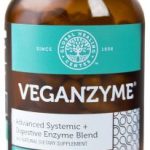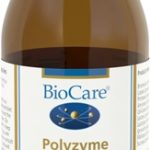When it comes down to it, there’s a whole host of things you may have heard you need to ensure your digestive system works like clockwork – or as close to it as possible. For every kind of ‘good bacteria’ there’s a plethora of probiotics and for every antioxidant there’s a Vitamin A, B or C. Well, like it or not, you should add to that list digestive enzymes. Chances are, you’ve heard of them. But are you familiar with them? Do you know what they are?
Why are digestive enzymes so necessary?
Frankly, the clue’s in the word ‘digestive; that is, they’re crucial to the digestion process. The reality is we don’t just eat food to sate hunger; we really do so to give the body what it needs to generate energy – those all-important energy-creating nutrients. And these nutrients have to be broken down once they’ve been extracted from the rest of the food we eat (which is ultimately excreted from the body). It’s here that digestive enzymes come in.
Because it’s these macromolecular entities, primarily produced in the pancreas and small intestine, that cause the chemical reactions that break down the nutrients to their building blocks – proteins to amino acids, fats to cholesterol and fatty acids, carbohydrates to simple sugars and, less specifically, vitamins, minerals and other plant and animal compounds. If there aren’t enough of these enzymes in the digestive tract, the body will struggle to break down the food’s nutrients into its constituent parts so they can be absorbed by cells; thus, even if your diet’s good and you’re eating well, it won’t be enough – you still won’t be getting the nutrition you need.
How are digestive enzymes disrupted?
There are various reasons why your digestive enzymes may not be working as they should. The following things could upset their normal activity or, indeed, reduce their numbers; in other words cause digestive enzyme deficiency:
- Chronic stress – maybe the most common cause of digestive enzyme issues; digestive function (and that of digestive enzymes) is dialled back when the human body’s in the ‘stressed’ (or ‘fight or flight’) mode and generally proceeds as normal when it’s in the ‘relaxed’ (or ‘rest and digest’) mode
- Ailments – serious illnesses affecting the pancreas (such as cystic fibrosis, pancreatic cancer and acute/ chronic pancreatitis), Crohn’s disease and Celiac disease (which can flatten or destroy the borders of particular cells) can massively hinder the efficacy of digestive enzymes
- Low-grade inflammation – specifically in the digestive tract and often caused by a neuroendocrine response to a food allergy, a parasitic infection or dysbiosis (microbial imbalance) can reduce the tract’s digestive enzyme population.
Dealing with digestive enzyme issues
In many cases where you’re obliged to improve your digestive health, enhancing your diet is a natural first step. And it can definitely prove beneficial for digestive enzyme problems (including boosting their numbers), but as mentioned already, adopting a healthier, more nutritious and balanced diet won’t likely be enough. For instance, ensuring your gut flora’s in balance is also advisable – that is, restoring the balance of ‘good’ and ‘bad’ intestinal bacteria, often via probiotic supplementation.
And, as also touched on, the need to reduce chronic stress in your everyday life is of great significance when it comes to aiding digestive enzymes. Try to get out of the ‘fight or flight’ mode more often; allow a restful period following a meal to enable the food to settle and begin digesting – just as you’re likely to have been ordered to when you were little!
Digestive enzyme supplements
Moreover, if you are suffering from a deficiency in digestive enzymes, you obviously need to increase their numbers (a clue you’re deficient could be abnormal stools; do they appear overly soft or entirely fluid/ diarrhoea-like or do they float?). A reliable way to go about this is through natural supplementation. And, to cover all bases, multi-enzyme products are probably the way to go, as it’s these that are most likely to include the different kinds we all need – for instance, proteases (to break down proteins), lipases (to break down fats), and carbohydrases like amylase (to break down carbohydrates).
A good place to start is the ‘Digestive enzymes’ section of our website. Indeed, among many others, the following popular supplements are available through us at The Finchley Clinic:
Active Digestive Enzymes – this product, comprising 17 different types of enzyme, may help with acid indigestion, acid reflux, bloating and gas, colon cleansing, constipation, diarrhoea, heart burn, irritable bowel syndrome (IBS) and lactose intolerance.
Veganzyme – contains a wide selection of kosher-certified, vegetarian-based enzymes, helping the body to digest carbohydrates, fats, bran, legumes, nuts and seeds, cereals, dairy, fruits and vegetables, gluten, proteins, sugars, soy and other foods.
Polyzyme Forte – a high potency, broad-spectrum enzyme product; also contains Lactobacillus acidophilus to help maintain healthy gut flora.



